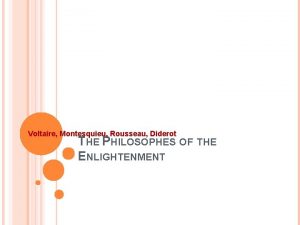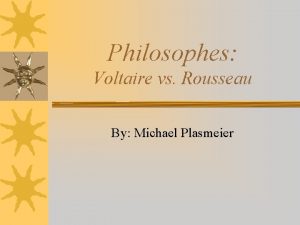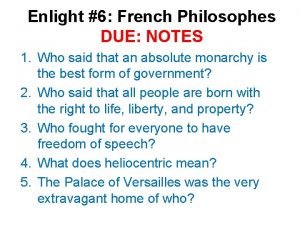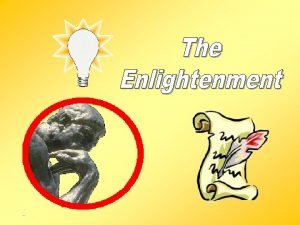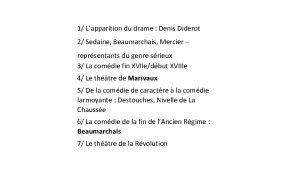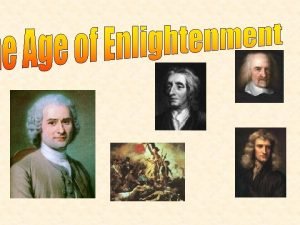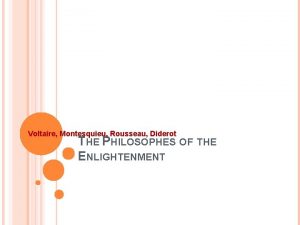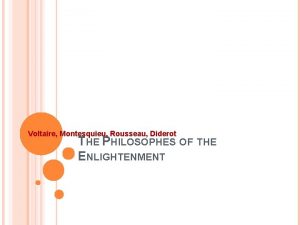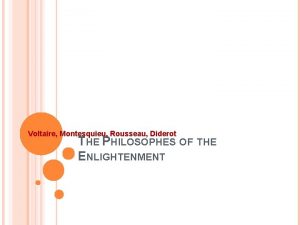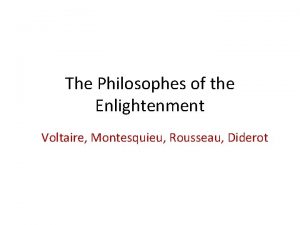Voltaire Montesquieu Rousseau Diderot THE PHILOSOPHES OF THE






- Slides: 6

Voltaire, Montesquieu, Rousseau, Diderot THE PHILOSOPHES OF THE ENLIGHTENMENT

VOLTAIRE (1694 -1778) Background � Born the son of a French notary/ noble later educated by Jesuits. Friends/Enemies � Not many friends but countless enemies were made. Significant enemies include French monarchs and Frederick the Great AFTER Voltaire's betrayal. Core Beliefs • • Voltaire had a knack for offending people and he knew this, but had no regrets, as he repeatedly went into to exile. -individual liberty, freedom of religion, freedom of press, freedom of speech, trial by jury, no arrest without reason Dislikes most countries besides England Important writings Candide- attacks war, religious persecution, and optimism about the human condition � Letters On The English- praised English society and religious toleration while criticizing the abuses of French society � Elements of the Philosophy of Newton- popularized Newton’s ideas across Europe � Lasting impacts � Inspired the original 10 amendments to the U. S. constitution Epitaph It is dangerous to be right in matters on which the established authorities are wrong

MONTESQUIEU (1689 -1755) Background -Noble of the robe - Involved in Science Academy of Bordeaux -Visited England (inspiration for Spirit of Law) Friends/Enemies -Catholic Church banned Spirit of Law -Champion of liberty in England -Catherine the Great used ideas -Liked by American Founders such as James Madison -Made fun of Louis XIV, not liked by Louis XV -Lord Waldegrave, nephew of Duke of Berwick, was traveling companion -Acquaintance of Viscount Bolingbroke Epitaph

MONTESQUIEU (1689 -1755), CONT. Core Beliefs - Development of Political Theories Divided French society into three groups: The monarchy, aristocracy, and the commons Stated there were two existing governmental powers: 1) Sovereign and 2)Administrative, which includes the legislative, judicial, and executive branches- he eliminated the three estates structure of the French monarchy Three forms of government- dependent on the characteristics of each country Monarchies (monarch), republics (people), and despotism (tyrant) - Study of Anthropology Human Rights Wrote many arguments against slavery “all men are born free and yet all over the world man is in chains” Promogenitor- believes in the abilities of women to rule/ act as head of family Meteorological climate theory- the surrounding areas effect how people act and their type of effective government Impact of material conditions like energy sources/technology/socio-cultural systems The climates effect how people act- hot muggy climates=hot temper, cold climate=cold hearted o Most Important Writings -Spirit of the Law: Political treatise wherein he proposes separation of powers and argues for a democratic government - The Persian Letters: Novel where two Persians comment on French culture after traveling to Paris Lasting Impact/Influence -Influences U. S. government( Executive, Legislative, Judicial)

ROUSSEAU (1717 -1778) Background Born in Geneva, Switzerland At 13, his formal education ended and he certified legal documents briefly before becoming a watchmaker After three years of miserable work, Rousseau was locked out of the city gates and was starting from scratch He settled in France under the roof of Louise Eleanore, Baronne de Warens, and spent his time jumping jobs, reading, studying and thinking. Friends/Enemies - A true outsider to the Enlightenment…temp relationship with Diderot Core Beliefs Natural man is physically free because he is not constrained by society and by the state. Man is psychologically and spiritually free because he isn’t captured by what modern society deems as being needed in life. Man’s enslavement to their own needs is the reason why they are socially ill and have a lower self esteem. Freedom of citizens should be the core of any government Man’s natural state is no longer achievable but acknowledging it and understanding it will lead to man being more good than evil. Famous Works – Emile; Social Contract; Confessions Epitaph

DIDEROT (1713 -1784) Background Story: � He was born in Langres, France, the son of a well-know master cutler. He was educated by Jesuits and received a degree in Master of Arts at the University of Paris. He lived a rapidly changing lifestyle, with a variety of odd jobs under his belt. He spent a lot of time in coffeehouses discussing with other philosophes like Rousseau. Friends/Enemies in High Places: � Long friendship with Rousseau but ended up being his enemy after a quarrel Core Beliefs: � Roman Catholicism to Deism to Atheism to Philosophic modernism � Didn’t develop any original philosophies, but ideas about others influenced many thinkers and philosophers � Explored idea that individuals should be judged on different moral standards depending on circumstances � Type of education depends on the individual learning Major Writings: � Encyclopedia: like a dictionary for information; 17 volumes with over 100 contributors; info on various engineering subjects (agriculture methods, ship building, canals, etc. ) and criticized religious institutions and authoritative governments � Rameau’s Nephew: satire? ? ? Lasting Impact and Influence: � Rousseau wrote that in later centuries, he would be as respected as Plato and Aristotle were at that time. � Influenced later: Balzac, Delacroix, Marx Epitaph “Hurrah for wisdom and philosophy!”
